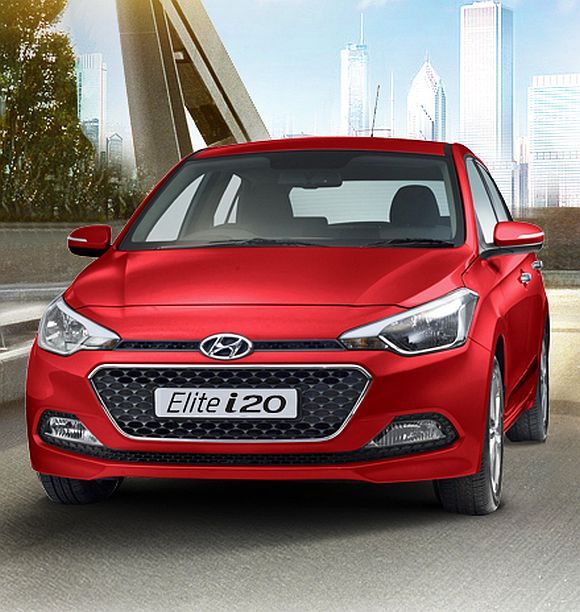With a fresh tag line, 'New thinking new possibilities', Hyundai's new strategy will include more localised products that are easy to drive and are comfortable.

Hyundai Motors India has set itself a new target. Sixteen years after entering India, the South Korean automotive giant is revamping its strategy in order to become the leader in the compact car segment, a space that is occupied at present by Maruti Suzuki India.
Hyundai Motors is only a distant second with sales at just a third of Maruti Suzuki's.
To close the gap, Hyundai is switching its focus from exports to the domestic market.
Exports were necessary for Hyundai to generate scale and benchmark the quality of its products, but with demand from the domestic market increasing, the company has stopped exports to several European markets.

With a fresh tag line, 'New thinking new possibilities', the car maker's new strategy will also include more localised products that are easy to drive and are comfortable.
Hyundai Motors plans to launch at least three new products or refurbishments every year to take sales to 4.10 lakh units from the 3.80 lakh at present, says Rakesh Srivastava, senior vice-president (marketing and sales).
In addition, it also wants to mark its presence in the SUV (sports utility vehicle) and MPVs (multi-purpose vehicle) segments.
The company hopes to attract customers by focusing on comfort, features and fuel economy, in decreasing order of importance.
In comparison, the priority order for Maruti Suzuki is mileage, features and comfort.
With consumers becoming increasingly more demanding, many believe Hyundai's priorities are in the right place. Its market share has been steadily increasing since 2010, from 19.1 per cent back then to 21.6 per cent now. Volumes too have been growing.

It sales increased 14.5 per cent in September and 12.8 per cent for the first half of the year on the back of strong performance by its new i20 premium hatchback.
The company has launched four cars- the i10 Grand, Santa Fe, Xcent and the i20 Elite- in the last 10 months since September 2013. All of them are India-specific cars that will also be marketed globally.
To keep sales ticking, Hyundai is betting on its new concept of 'Fluidic design'.
The guiding principle of its design philosophy is to make its cars more refined, sophisticated and sporty by taking cues from its global brands.
The Elite i20, with its modern appeal and premium interiors, is based on the Fluidic concept. At the core of the philosophy is simple, harmonious designing that is easy on the eye and is aesthetically pleasing.
Besides upping the ante on design, Hyundai is also looking at the SUV segment, an area that rival Maruti Suzuki is also keen to break into.

The SUV segment is important for the South Korean company if it is to have a realistic shot at becoming the market leader, and if it is to keep the sales gap with Maruti, which has 44 per cent of the market, from widening.
With global products in the SUV and MPV segments, Hyundai believes it has the technological edge but needs to customise the product for the country.
In the MPV segment, the company has been selling the Santa Fe SUV in India as a completely-built unit.
Still, catching up with Maruti Suzuki won't be easy. Hyundai sells 30,000-36,000 units every month, compared to Maruti Suzuki's 85,000-90,000 units.
The gap is set to widen as Maruti prepares to launch at least four new models. In September, it released the mid-range sedan Ciaz. Its aim is to replicate across all segments its success in the small-car market.
The challenges facing Hyundai are numerous. First of all, its available production capacity might not be enough to meet future demand.
Its current production is 6.3 lakh units per year, which can be ramped up to 6.8 lakh units. This means the company needs to look at a second plant if it really wants to step up its India play.
Industry experts were expecting an announcement in this regard during the recent visit of Hyundai's global Chairman Chung Mong-koo, but were disappointed when no such proposal was made.
The other thing that Hyundai needs to do to is to strengthen its dealership network.
Currently, Hyundai has 400 dealerships and over 270 rural sales outlets supported by over 1,000 service centers across India.
In comparison, Maruti has around 1,400 sales outlets, of which 50 per cent are located in rural areas.











